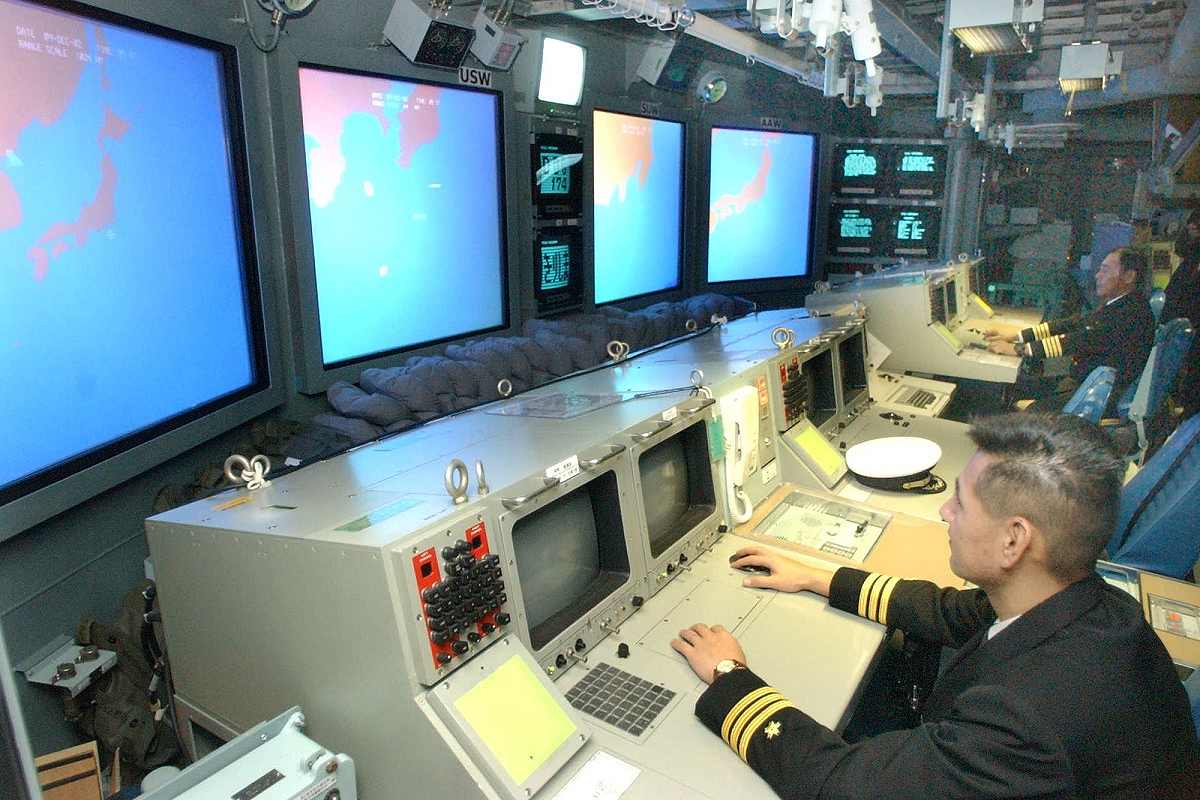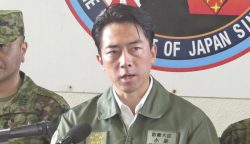Mishandling of Secrets Normalized at MSDF; Misunderstanding, Manpower Shortage Major Factors

An array of operational data is displayed on computer screens inside the combat information center (CIC) aboard the destroyer Kirishima.
17:54 JST, July 13, 2024
Unlawful handling of “specially designated secrets,” defined as classified information related to national security, appears to have become normal in the Maritime Self-Defense Force.
Such misconduct has primarily stemmed from misinterpretations of the Law on the Protection of Specially Designated Secrets, but a structural factor has also emerged related to a chronic shortage of manpower.
Not only could the current state of affairs impair the public’s trust, which is indispensable for a planned dramatic strengthening of the country’s defense capabilities, but it could also shake the confidence of allied and friendly countries. The Defense Ministry must lose no time in rebuilding its organization.
In a destroyer’s nerve center
On Friday morning, MSDF Chief of Staff Ryo Sakai held a special press conference at the Defense Ministry, bowing deeply.
“On board a vessel, there are people who handle designated secrets and those who do not, working side by side in the same place. It had been difficult to maintain the system for protecting such information, while the definition [of the unauthorized disclosure of information] had not been spread sufficiently among personnel, giving rise to many incidents involving those on duty aboard the vessels,” Sakai said.
Out of 58 cases of mishandling of designated secrets, 38 were systematically conducted aboard vessels.
According to an informed source, designated secrets, such as information on submarine wakes, are displayed on computer screens at the combat information center (CIC), from which operations are commanded. Even conversations among personnel handling such tasks include such secrets.
However, personnel who were not qualified to handle designated secrets were routinely moving in and out of the CIC, for tasks such as organizing marine charts and repairing machinery.
One example of a secrecy rule violation occurred last November. Aboard the destroyer Akebono, on an anti-piracy mission in the Gulf of Aden off the Somali coast in East Africa, the CIC was charged with tension.
Around this time, there occurred an incident in which a missile was fired in the direction of the Gulf of Aden from the coastal nation of Yemen. The possibility of the Akebono coming under attack could not be ruled out.
The commanding officer, who decided that it was necessary for everyone working at the CIC to share the intelligence, had the information, including designated secrets, displayed on large screens. However, one of the members who happened to be at the CIC had not undergone a security clearance assessment. As a result of the investigation, this case was judged as an “unauthorized disclosure of information.”
No training provided
Under the Law on the Protection of Specially Designated Secrets, besides such an incident as occurred aboard the Akebono, in which an unqualified member came to learn some designated secrets, it is also illegal for such personnel to be in a “position capable of learning” the secrets by, for example, coming close to a monitor displaying such designated secrets.
Lying behind the succession of the unauthorized disclosures of information aboard the destroyers is that senior MSDF officers and personnel were unaware of the unlawfulness of the situations. Within the MSDF, relevant training was not conducted.
While the Defense Ministry’s internal bureau that supervises the system linked to designated secrets said that it understood the definition of the unauthorized disclosure of information, it was unaware of the MSDF’s misconduct until the latest investigation was conducted. About 200 MSDF personnel are thought to have come into contact with designated secrets under illegal conditions.
A related issue is the MSDF’s personnel shortage.
On the destroyer Setogiri, the “operations specialist” responsible for handling designated secrets at the CIC was transferred to another vessel, leading to an unqualified person taking over the duty at the CIC.
Although the new person did not engage in any tasks involving designated secrets, they wound up coming into contact with some secrets, which was recognized as “unauthorized disclosure of information.”
The rate of such personnel vacancies filled in the MSDF is only 93.3%. The shortage of operations specialists is seen as a reason why such incidents have happened.
Screening for all
The MSDF plans to have all personnel who may go in and out of the CIC obtain security clearances. It is estimated that about 2,000 personnel will newly undergo a security clearance assessment. An official in charge at the Defense Ministry said: “Presently, we have banned personnel who are not qualified from entering the CIC. We can’t say this has not hindered their duties.”
To prevent similar incidents, the ministry aims to work out a system for the centralized control of entry to and exit from the security area, thus eliminating human error.
Retired Rear Adm. Yasuhiro Kawakami, currently the director of the Security Studies Program at the Sasakawa Peace Foundation, said, “First of all, they must solidly push forward measures to prevent a recurrence.”
He also said: “While the MSDF’s missions have been expanding, prospective personnel needed for such tasks have not joined the force in sufficient numbers. So the MSDF has fallen into a downward spiral of formulating regulations whenever a scandal occurs, all while their work is increasing. They should reduce the burden on frontline personnel by making drastic reforms.”
Top Articles in Politics
-

Japan PM Takaichi’s Cabinet Resigns en Masse
-

Sanae Takaichi Elected Prime Minister of Japan; Keeps All Cabinet Appointees from Previous Term
-

Japan’s Govt to Submit Road Map for Growth Strategy in March, PM Takaichi to Announce in Upcoming Policy Speech
-

LDP Wins Historic Landslide Victory
-

LDP Wins Landslide Victory, Secures Single-party Majority; Ruling Coalition with JIP Poised to Secure Over 300 seats (UPDATE 1)
JN ACCESS RANKING
-

Japan PM Takaichi’s Cabinet Resigns en Masse
-

Japan Institute to Use Domestic Commercial Optical Lattice Clock to Set Japan Standard Time
-

Israeli Ambassador to Japan Speaks about Japan’s Role in the Reconstruction of Gaza
-

Man Infected with Measles Reportedly Dined at Restaurant in Tokyo Station
-

Videos Plagiarized, Reposted with False Subtitles Claiming ‘Ryukyu Belongs to China’; Anti-China False Information Also Posted in Japan





















